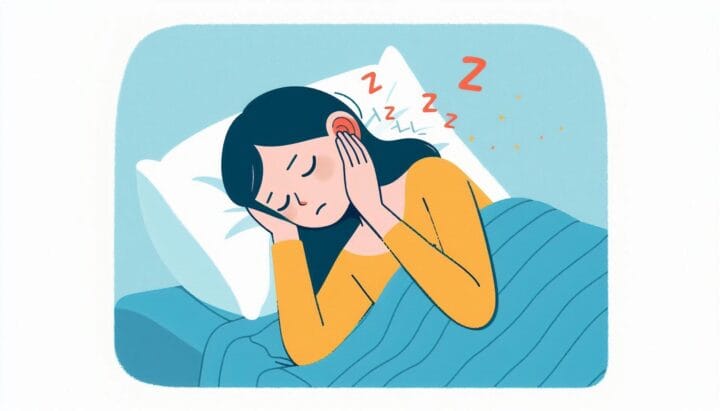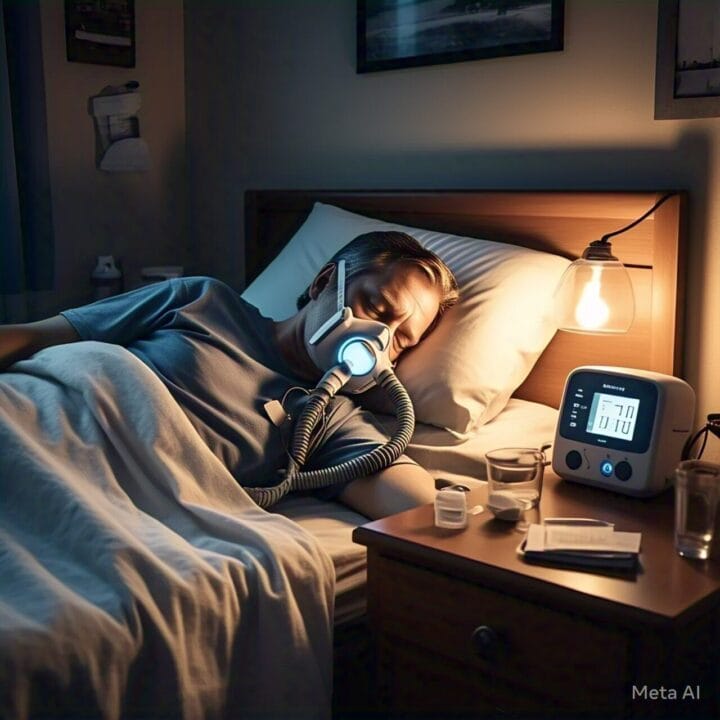Tinnitus and Sleep Apnea: The Surprising Connection Revealed
Table of Contents

Tinnitus and Sleep Apnea: When Ringing Ears Meet Troubled Breathing
Ever lie awake at night, your ears buzzing like a swarm of angry bees, while your partner complains about your snoring? You might be dealing with the dynamic duo of tinnitus and sleep apnea. These two conditions often go hand in hand, creating a perfect storm of sleepless nights and frustrating days. Let’s dive into this unexpected connection and see how we can tackle both issues head-on.
The Nighttime Nemeses: Tinnitus and Sleep Apnea Explained
Tinnitus and sleep apnea are like unwelcome bedtime buddies. One fills your ears with phantom sounds, the other disrupts your breathing. But how are they related?
Tinnitus: The Phantom Orchestra in Your Head
Tinnitus is like having a personal sound system that you can’t turn off. It’s characterized by:
- Ringing, buzzing, or whistling sounds in the ears
- Sounds that no one else can hear
- Varying intensity and frequency
- Potential impact on concentration and mood
Sleep Apnea: The Breath Thief
Sleep apnea, on the other hand, is when you stop breathing for short periods during sleep. It’s like your airway decides to play hide and seek, but forgets to come back. Signs of sleep apnea include:
- Loud snoring
- Gasping for air during sleep
- Daytime fatigue
- Morning headaches
- Difficulty concentrating
The Twisted Tango: How Tinnitus and Sleep Apnea Dance Together
Now, you might be wondering, “What do ringing ears and breathing problems have in common?” More than you’d think! These two conditions often occur together, creating a vicious cycle that can wreak havoc on your sleep and overall health.
The Chicken or the Egg?
It’s not always clear which comes first – tinnitus or sleep apnea. Some researchers believe that sleep apnea might trigger or worsen tinnitus. It’s like your body’s alarm system going haywire, trying to wake you up when you stop breathing. Others think tinnitus might make it harder to fall asleep, leading to sleep disorders like apnea. Either way, they’re often found in the same bed, so to speak.
The Domino Effect
When these two team up, it’s bad news for your sleep quality. Sleep apnea disrupts your sleep cycle, which can increase stress and tension – prime conditions for tinnitus to flourish. Meanwhile, the constant ringing of tinnitus can make it hard to fall asleep, potentially exacerbating sleep apnea symptoms. It’s like a never-ending game of ping pong in your head and throat.
Spotting the Signs: Are You a Victim of the Tinnitus-Apnea Duo?
Identifying if you have both tinnitus and sleep apnea can be tricky, especially since they happen while you’re asleep. But there are some telltale signs:
- Waking up with a ringing in your ears and a headache
- Daytime fatigue despite sleeping a full night
- Your partner complains about both your snoring and your complaints of ear ringing
- You have difficulty concentrating during the day
- Morning dry mouth and sore throat
If you’re nodding along to these, it might be time to chat with a sleep specialist or ENT doctor.
The Science Behind the Struggle
Let’s get a bit nerdy for a moment (but in a cool way, I promise). There’s actual science behind this tinnitus-apnea connection. Studies have shown that people with sleep apnea are more likely to experience tinnitus. One theory is that the repeated drops in oxygen levels during sleep apnea episodes can damage the delicate hair cells in the inner ear, leading to tinnitus.
Another fascinating finding is that the loud snoring associated with sleep apnea might actually contribute to hearing damage over time. It’s like your own snoring is giving you tinnitus – talk about adding insult to injury!
Breaking the Cycle: Treatment Options for the Dynamic Duo
Now that we know these two are partners in crime, how do we break them up? Treating both conditions simultaneously is often the most effective approach. Here are some options:
1. CPAP Therapy: The Air Pressure Superhero
Continuous Positive Airway Pressure (CPAP) therapy is the gold standard for treating sleep apnea. It’s like giving your airway a little air mattress to keep it open all night. Bonus: Many people find their tinnitus improves with CPAP use, possibly due to better sleep quality and improved oxygen levels.
2. Sound Therapy: Fighting Fire with Fire
For tinnitus, sound therapy can be a game-changer. It’s like using background noise to drown out that annoying person talking loudly on their phone in a coffee shop. Options include:
- White noise machines
- Nature sound recordings
- Specially designed tinnitus masking devices
3. Cognitive Behavioral Therapy (CBT): Retraining Your Brain
CBT can be effective for both tinnitus and sleep apnea. It’s like teaching your brain new tricks to cope with these conditions. CBT can help you:
- Change negative thought patterns about your symptoms
- Develop better sleep habits
- Reduce stress and anxiety related to your conditions
4. Lifestyle Changes: The Power of Good Habits
Sometimes, simple changes can make a big difference:
- Losing weight (if needed)
- Avoiding alcohol before bed
- Sleeping on your side
- Practicing good sleep hygiene
- Managing stress through relaxation techniques
Think of it as giving your sleep environment and habits a makeover.
The Long-Term Outlook: What to Expect
Living with tinnitus and sleep apnea isn’t a walk in the park, but with proper treatment, many people see significant improvements. Here’s what you might experience:
- Better sleep quality
- Reduced daytime fatigue
- Less intense or frequent tinnitus symptoms
- Improved overall health and quality of life
Remember, it’s a marathon, not a sprint. Be patient with your treatment and consistent with your habits.
When to Seek Help: Don’t Go It Alone
If you suspect you might have tinnitus, sleep apnea, or both, don’t try to tough it out. These conditions can have serious long-term effects on your health if left untreated. Seek help if:
- Your tinnitus is severely impacting your quality of life
- You consistently wake up feeling unrefreshed
- Your partner notices loud snoring or breathing pauses during sleep
- You feel excessively tired during the day despite getting enough sleep
A sleep specialist, ENT doctor, or audiologist can help diagnose and treat these conditions.
Conclusion: Your Path to Better Sleep and Quieter Nights
Tinnitus and sleep apnea might seem like a nightmare duo, but understanding their connection is the first step toward finding relief. By addressing both conditions, you can improve your sleep quality, reduce that annoying ringing in your ears, and boost your overall health. Remember, you don’t have to suffer in silence (or keep your partner up all night with your snoring and tossing and turning). With the right treatment and a bit of patience, you can break free from the tinnitus-apnea cycle and wake up feeling refreshed and ready to take on the world.
FAQs
- Can treating sleep apnea cure tinnitus?
While treating sleep apnea often improves tinnitus symptoms, it may not completely cure it in all cases. Some people might still need additional treatment for their tinnitus. - Are there any natural remedies for tinnitus and sleep apnea?
Some people find relief through lifestyle changes like weight loss, avoiding alcohol before bed, and sleeping on their side. However, these methods may not be sufficient for moderate to severe cases. - Can children have both tinnitus and sleep apnea?
Yes, children can suffer from both conditions. In fact, sleep apnea in children is sometimes associated with tinnitus. If you notice your child complaining of ringing ears or snoring loudly, consult a pediatrician. - How long does it take to see improvements after starting treatment?
The timeline varies for each person, but many people start to notice improvements in their sleep quality and reduced tinnitus symptoms within a few weeks of consistent treatment. - Can stress management techniques alone cure tinnitus and sleep apnea?
While stress reduction can certainly help, it’s usually not enough to completely resolve moderate to severe cases of tinnitus and sleep apnea. A comprehensive treatment plan often includes medical interventions alongside stress management techniques.













Post Comment